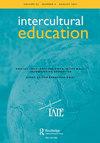跨文化教育中的复杂情境移情:一个实用工具
IF 0.8
Q3 EDUCATION & EDUCATIONAL RESEARCH
引用次数: 1
摘要
移情本质上是多维的,涉及人际互动的认知、社会情感和行为组成部分。它被认为是全球竞争力的核心要素。随着学校变得越来越多样化,同理心表达了从他人的角度观察社会状况的能力,在教育领域发挥着至关重要的人际和社会作用。使用德尔菲技术,本研究开发并验证了一种实用工具,通过对复杂的情感互动进行深入的话语分析,在模拟遭遇中练习,来识别移情行为。本文提出的人际沟通中的移情模式(EPIC)实用工具是通过结构化的工具验证过程开发和验证的,该过程能够以具体的方式解决多方面和复杂的移情现象。EPIC实用工具提供了一种新的方法来培养教师对文化差异和多样性的认识,同时完善沟通和情感技能,这是教师社会情感学习的重要组成部分。本文章由计算机程序翻译,如有差异,请以英文原文为准。
Being empathic in complex situations in intercultural education: a practical tool
ABSTRACT Empathy, being multidimensional in nature, addresses cognitive, social-emotional, and behavioural components of interpersonal interaction. It is considered a core element of global competence. As schools become more diverse, empathy, which expresses the ability to observe social situations from other people’s points of view plays a critical interpersonal and societal role in the educational arena. Using the Delphi technique, this study developed and validated a practical tool for identifying empathic behaviours through a deep discourse analysis of complex emotionally charged interactions, practiced in simulated encounters. The Empathic Patterns in Interpersonal Communication (EPIC) practical tool, presented in this paper, was developed and validated through a structured instrument validation process that enabled the multifaceted and complex phenomenon of empathy to be addressed in a concrete way. The EPIC practical tool offers a new approach to developing awareness to cultural differences and diversity among teachers while refining the communication and the emotional skills which are significant components in teachers’ socio-emotional learning.
求助全文
通过发布文献求助,成功后即可免费获取论文全文。
去求助
来源期刊

Intercultural Education
EDUCATION & EDUCATIONAL RESEARCH-
CiteScore
2.30
自引率
8.30%
发文量
36
期刊介绍:
Intercultural Education is a global forum for the analysis of issues dealing with education in plural societies. It provides educational professionals with the knowledge and information that can assist them in contributing to the critical analysis and the implementation of intercultural education. Topics covered include: terminological issues, education and multicultural society today, intercultural communication, human rights and anti-racist education, pluralism and diversity in a democratic frame work, pluralism in post-communist and in post-colonial countries, migration and indigenous minority issues, refugee issues, language policy issues, curriculum and classroom organisation, and school development.
 求助内容:
求助内容: 应助结果提醒方式:
应助结果提醒方式:


